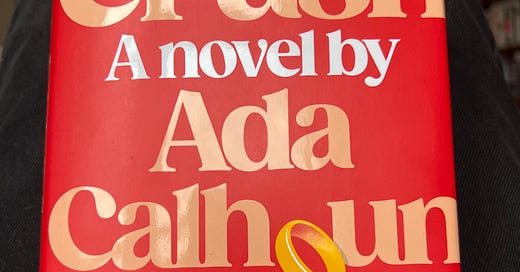CRUSH by Ada Calhoun
On Friday I started reading Ada Calhoun’s new novel, Crush. It was so good I canceled my Saturday night plans, and then read while standing at the kitchen counter on Sunday while having breakfast and finished it right in time to join my best friends for dinner in Chinatown with our children.
There are two things that I can never put down to go to bed in time, good novels and bad tv crime shows. Maybe I read this novel like a crime show, not who did it (and why) but will she stay with her lover, a religion teacher with whom she exchanges emails about philosophy and art which seem to rekindle her mind and soul and body?
Ada Calhoun is the daughter of the art critic Peter Schjeldahl and her previous book, Also a Poet, a memoir of her complicated relationship with her father, is a gem. It starts as a book on Frank O’hara and turns into a reflection on what it means to be the daughter of an art monster. I read it shortly after reading Musa Meyer’s Night Studio and there was a lot of overlap between the way Philip Guston and Peter Schjeldahl treated the wives and daughters who enabled them to carry on and do the work they wanted to make, with a narcissism and distance only matched by the pain they caused.
In Crush the narrator is married to a man who is an aspiring artist but has little to show for his decades of being an artist while his wife is supporting the family on her writing. He is a man-child and they are stuck until he suggests that his wife should try kissing other men. Kissing an old friend in London she is reminded of how much she enjoys making out, and she seems alive again. But where the novel really takes a pleasant fanciful turn is once she meets David, the religion professor, which whom she discusses Heloise and Abelard, Petrarch and who showers her with caring attention, a thing her father and husband have always denied her. The attention is irresistible.
The charm of this novel, which is vastly different from All Fours, is that it is quite old fashioned, it celebrates caring - caring for one’s children, one’s parents and one’s friends but refusing to disappear while caring. She will not be her mother to her father, or Musa Mayer to Guston’s genius, she will make her own art, love and care for her son, care for her parents and finally feel that ‘her soul ha[s] company’. The narrator is smart, her dead pan irony is hilarious and on point (about her father’s final days she says: ‘I stayed silent, I fed him berries. I tucked him into bed. I played him Beethoven. I felt his heart beating and then not beating. I buried him. That would have to do’) and above all she is a generous soul.
Right now, my daughter is asking me to come play with her, she is offering me mashed potato ice cream - any one wants some?
READ




